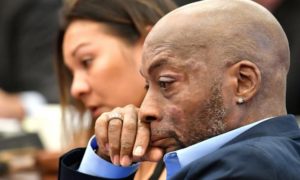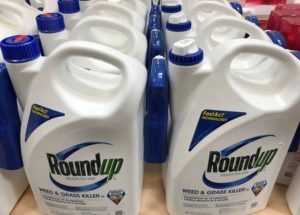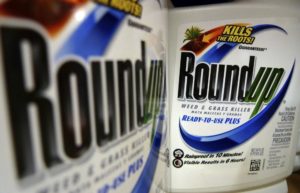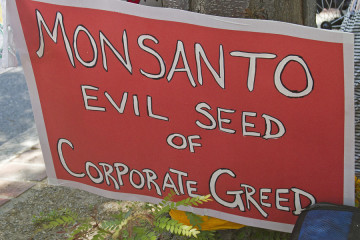Monsanto Ordered to Pay $280 Million to Dying Groundskeeper : A Well Thought Out Scream by James Riordan

Pesticide manufacturer Monsanto was found liable by a California jury on Friday in a lawsuit filed by a man who alleged the company’s glyphosate-based weed-killers, including Roundup, caused his cancer and ordered the company to pay $289 million in damages.
The case of school groundskeeper Dewayne Johnson was the first lawsuit to go to trial alleging glyphosate causes cancer. Monsanto, a unit of Bayer AG following a $62.5 billion acquisition by the German conglomerate, faces more than 5,000 similar lawsuits across the United States. A former pest control manager for a California county school system, Johnson, 46, applied the weed killer up to 30 times per year.
Monsanto in a statement said it would appeal the verdict. “Today’s decision does not change the fact that more than 800 scientific studies and reviews…support the fact that glyphosate does not cause cancer, and did not cause Mr. Johnson’s cancer,” the company said.
Monsanto denies that glyphosate, the world’s most widely used herbicide, causes cancer and says decades of scientific studies have shown the chemical to be safe for human use.
Johnson’s lawyers argued over the course of a month-long trial in San Francisco that Monsanto had “fought science” for years and targeted academics who spoke up about possible health risks of the herbicide product. Johnson was the first person to take the agrochemical corporation to trial over allegations that the chemical sold under the brand Roundup causes cancer.
The jury at San Francisco’s Superior Court of California deliberated for three days before finding that Monsanto had failed to warn Johnson and other consumers of the cancer risks posed by its weed killers.
It awarded $39 million in compensatory and $250 million in punitive damages.
Johnson’s case, filed in 2016, was fast-tracked for trial due to the severity of his non-Hodgkin’s lymphoma, a cancer of the lymph system that he alleges was caused by Roundup and Ranger Pro, another Monsanto glyphosate herbicide. Johnson’s doctors said he is unlikely to live past 2020.
DeWayne Johnson listens during the Monsanto trial in San Francisco last month.
Monsanto has long argued that Roundup is safe and not linked to cancer.
Brent Wisner, a lawyer for Johnson, in a statement said jurors for the first time had seen internal company documents “proving that Monsanto has known for decades that glyphosate and specifically Roundup could cause cancer.” He called on Monsanto to “put consumer safety first over profits.”
Over the course of the four-week trial, jurors heard testimony by statisticians, doctors, public health researchers and epidemiologists who disagreed on whether glyphosate can cause cancer.
The U.S. Environmental Protection Agency in September 2017 concluded a decades-long assessment of glyphosate risks and found the chemical not likely carcinogenic to humans. But the World Health Organization’s cancer arm in 2015 classified glyphosate as “probably carcinogenic to humans.”
Monsanto suffered a major blow with a jury ruling that the company was liable for a terminally ill man’s cancer, awarding him $289m in damages.
Dewayne Johnson, a 46-year-old former groundskeeper, won a huge victory in the landmark case on Friday, with the jury determining that Monsanto’s Roundup weedkiller caused his cancer and that the corporation failed to warn him of the health hazards from exposure. The jury further found that Monsanto “acted with malice or oppression”.
In the extraordinary verdict, which Monsanto said it intends to appeal, the jury ruled that the company was responsible for “negligent failure” and knew or should have known that its product was “dangerous”.
“We were finally able to show the jury the secret, internal Monsanto documents proving that Monsanto has known for decades that … Roundup could cause cancer,” Johnson’s lawyer Brent Wisner said in a statement. The verdict, he added, sent a “message to Monsanto that its years of deception regarding Roundup is over and that they should put consumer safety first over profits”.
Speaking in San Francisco on Friday, Johnson said that the jury’s verdict is far bigger than his lawsuit. He said he hopes the case bolsters the thousands of similar lawsuits pending against the company and brings national attention to the issue.
Johnson’s case was particularly significant because a judge allowed his team to present scientific arguments. The dispute centered on glyphosate, which is the world’s most widely used herbicide. The verdict came a month after a federal judge ruled that cancer survivors or relatives of the deceased could bring similar claims forward in another trial.
Plaintiff Dewayne Johnson, center at podium, surrounded by his attorneys, takes questions from the media after the Monsanto trial in San Francisco Friday, Aug. 10, 2018. A San Francisco jury ordered agribusiness giant Monsanto to pay $289 million to the former school groundskeeper dying of cancer, saying the company’s popular Roundup weed killer contributed to his disease. The lawsuit brought by Johnson was the first to go to trial among hundreds filed in state and federal courts saying Roundup causes non-Hodgkin’s lymphoma, which Monsanto denies. (AP Photo/Paul Elias)
During the lengthy trial, the plaintiff’s attorneys brought forward internal emails from Monsanto executives that they said demonstrated how the corporation repeatedly ignored experts’ warnings, sought favorable scientific analyses and helped to “ghostwrite” research that encouraged continued usage.
Monsanto has long argued that Roundup is safe and not linked to cancer and presented studies during trial that countered the research and testimony submitted by Johnson’s team. The herbicide is registered in 130 countries and approved for use on more than 100 crops, but in 2015, the World Health Organization’s international agency for research on cancer (IARC) classified glyphosate as “probably carcinogenic to humans”, triggering a wave of legal and legislative challenges.
Scott Partridge, the vice-president of Monsanto, released a statement after the verdict asserting that “glyphosate does not cause cancer, and did not cause Mr Johnson’s cancer”, adding: “We will appeal this decision and continue to vigorously defend this product, which has a 40-year history of safe use and continues to be a vital, effective, and safe tool for farmers and others.”
Upon hearing the verdict Dewayne Johnson said he hopes the case bolsters the thousands of lawsuits pending against the company and brings national attention to the issue. He said that the jury’s verdict is far bigger than his lawsuit. Johnson spoke briefly in his lawyers’ offices after the verdict was announced Friday. Johnson declined to take questions from reporters.
Monsanto says it’ll appeal. Company spokesman Scott Partridge says Monsanto sympathizes with Johnson but hundreds of scientific studies and government agencies have concluded that Roundup doesn’t cause cancer.
Monsanto Co. says it will appeal a $289 million verdict Company spokesman Scott Partridge said Friday that Monsanto sympathizes with Dewayne Johnson and his family. But Partridge said hundreds of scientific studies and government agencies have concluded that its Roundup weed killer doesn’t cause cancer. The St. Louis-based company is facing about 2,000 similar lawsuits across the country. Dewayne Johnson’s attorney, Robert F. Kennedy Jr., says the San Francisco verdict should bolster the chances of the other lawsuits.







No Comment